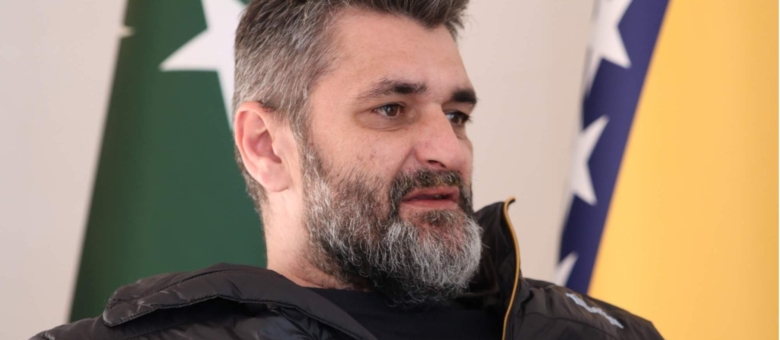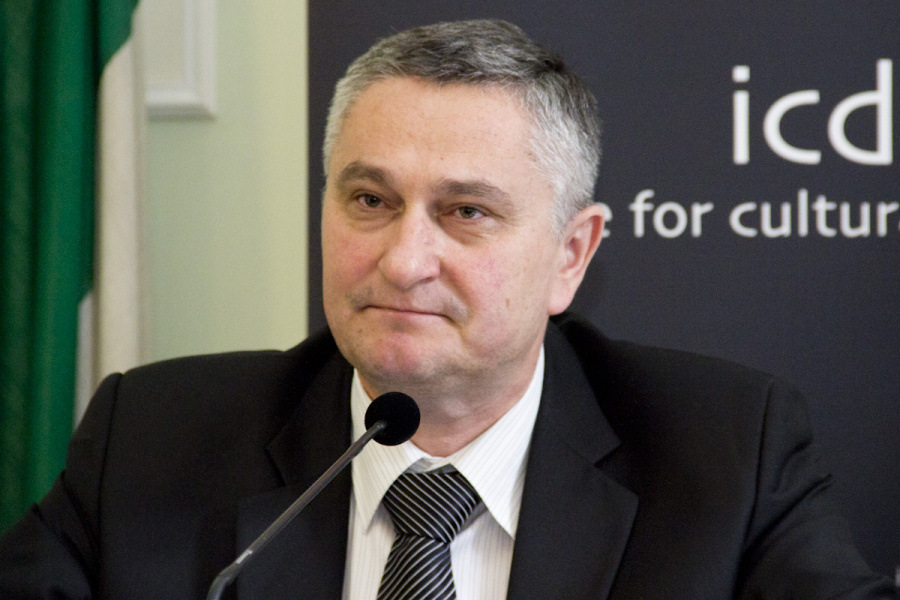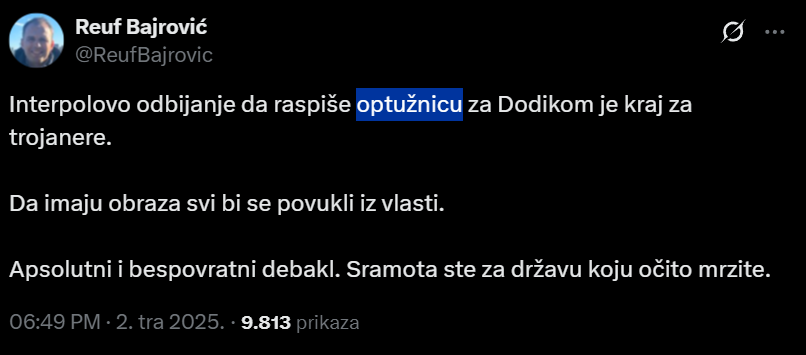
By: Poskok Editorial Team
For over a decade, the U.S. Embassy in Sarajevo has been regarded as a stabilizing force in Bosnia and Herzegovina—a symbol of democratic commitment and Western oversight. But recent revelations suggest that during key years, it may have functioned as something entirely different: a compromised structure, where non-vetted domestic operatives with prior ties to Iran gained access to sensitive data, manipulated the justice system, and possibly violated the civil rights of dozens—if not hundreds—of citizens.
A breach from within
 The alleged core of this quiet scandal revolves around two well-known public figures in Sarajevo: Reuf Bajrović and Emir Suljagić. Both are presented to international audiences as reformers and liberal secularists. However, multiple sources and police records suggest that the pair—while deeply embedded in NGO and political networks—also operated informal channels inside the U.S. Embassy, used diplomatic contacts to delete criminal files, and helped construct blacklists and indictments against political opponents.
The alleged core of this quiet scandal revolves around two well-known public figures in Sarajevo: Reuf Bajrović and Emir Suljagić. Both are presented to international audiences as reformers and liberal secularists. However, multiple sources and police records suggest that the pair—while deeply embedded in NGO and political networks—also operated informal channels inside the U.S. Embassy, used diplomatic contacts to delete criminal files, and helped construct blacklists and indictments against political opponents.
Their direct diplomatic cover came through Todd Anderson, a now-retired American diplomat who allegedly acted as a quiet “fixer” for their requests inside the Embassy.
The “Bullet Incident” that vanished from the system
 Perhaps the most vivid example is the so-called “Bullet Affair”—a bizarre, now-erased criminal case in which Bajrović and Suljagić allegedly fabricated a death threat by sending a bullet to themselves, staged a panic, and used the event to galvanize public support as victims of extremism.
Perhaps the most vivid example is the so-called “Bullet Affair”—a bizarre, now-erased criminal case in which Bajrović and Suljagić allegedly fabricated a death threat by sending a bullet to themselves, staged a panic, and used the event to galvanize public support as victims of extremism.
The PR campaign was organised by Darko Brkan, a USAID-backed activist who would later become Facebook’s official fact-checker for the entire Balkans. Brkan also organised a public protest, and the entire affair was used to discredit religious institutions and opposition figures.
Yet the case—involving a criminal offense of false reporting—does not exist in the police database today. It was removed entirely. Multiple embassy insiders confirm: Todd Anderson facilitated the deletion.
Domestic violence, and a file that never reached court
 Another case involves Suljagić himself and a reported instance of domestic violence. In the early 2010s, according to police sources, his partner was found bleeding and disoriented, having allegedly been thrown against a radiator. Police filed a report. She gave a formal statement.
Another case involves Suljagić himself and a reported instance of domestic violence. In the early 2010s, according to police sources, his partner was found bleeding and disoriented, having allegedly been thrown against a radiator. Police filed a report. She gave a formal statement.
Today, that file is gone. It was never prosecuted, never debated. Like others, it vanished from official systems.
Iranian ties and unchecked access
 Suljagić’s background alone would raise concerns in any intelligence office. He was reportedly employed at the Iranian Embassy in Zagreb after the Bosnian war. His uncle, Aziz Hasanović, was publicly known for celebrating the 9/11 attacks, a stance that should have triggered security scrutiny by any allied nation.
Suljagić’s background alone would raise concerns in any intelligence office. He was reportedly employed at the Iranian Embassy in Zagreb after the Bosnian war. His uncle, Aziz Hasanović, was publicly known for celebrating the 9/11 attacks, a stance that should have triggered security scrutiny by any allied nation.
Yet no formal vetting was ever carried out by the U.S. Embassy. Suljagić went on to hold high-ranking public positions and access to sensitive communications—with full diplomatic trust.
Questions about enrichment
 While this access was being used, financial benefits were also growing. Brkan now reportedly owns multiple real estate properties in Sarajevo. Bajrović’s wife, Ivana Cvetković, is said to have purchased property in Treskavica, a prized mountain resort area.
While this access was being used, financial benefits were also growing. Brkan now reportedly owns multiple real estate properties in Sarajevo. Bajrović’s wife, Ivana Cvetković, is said to have purchased property in Treskavica, a prized mountain resort area.
Crucially, Ivana Cvetković is also the long-time head of the National Endowment for Democracy (NED) for Bosnia and Herzegovina.
NED, while officially a democracy-promotion foundation, often operates parallel to U.S. State Department interests in fragile democracies. Its local representatives wield considerable power over civil society ecosystems, project funding, and political narratives.
Her role becomes even more significant in light of her alliance with Brkan, a serial USAID grantee. Insiders claim that Brkan once lobbied, with support from within the Embassy, to gain control over RAK, Bosnia’s Agency for Communications—effectively trying to place national media regulation in the hands of a private activist network aligned with U.S. soft power infrastructure.
Combined with her control over NED funding and Brkan’s enforcement role via Facebook, this amounted to an attempted capture of civil society, funding channels, and media oversight—by a small, ideologically uniform clique.
The enabling diplomats: Cormack and Murphy
 During the tenures of Ambassadors Maureen Cormack and Michael Murphy, the political influence of Bajrović and Suljagić reached its peak. Both diplomats, widely regarded as competent and loyal career officials, unknowingly served as conduits for a compromised internal structure.
During the tenures of Ambassadors Maureen Cormack and Michael Murphy, the political influence of Bajrović and Suljagić reached its peak. Both diplomats, widely regarded as competent and loyal career officials, unknowingly served as conduits for a compromised internal structure.

Described by insiders as “two Iranian errand boys without knowing it,” Cormack and Murphy ran a mission where local operatives with ties to foreign networks effectively dictated parts of the internal agenda. They had no idea that inside the embassy—beneath their very noses—were individuals acting in parallel with Iranian strategic interests, shielding domestic political allies and deleting state records.
A final, revealing slip
 Perhaps the most telling detail came just days ago, when Reuf Bajrović commented on Interpol’s refusal to issue a red notice for Bosnian Serb leader Milorad Dodik. In his post, Bajrović mistakenly referred to it as “a rejected indictment.”
Perhaps the most telling detail came just days ago, when Reuf Bajrović commented on Interpol’s refusal to issue a red notice for Bosnian Serb leader Milorad Dodik. In his post, Bajrović mistakenly referred to it as “a rejected indictment.”
To most, it sounded like a harmless mix-up. But to those familiar with his alleged activities, it was a window into his operational mindset. Indictments are his tool. They are the language of his political engineering, not a term pulled randomly from legal vocabulary.
It wasn’t a mistake. It was a reflex—a brief moment in which the façade fell away, and the activity log beneath it briefly flashed on screen.
A compromised mission in the heart of Europe
It’s time for the Biden administration—and potentially U.S. law enforcement—to ask some serious questions:
- Who enabled the manipulation of American diplomatic infrastructure in Sarajevo?
- Who lost rights, jobs, reputations, or freedom due to blacklists and indictments created in this shadow network?
- And who will now be held accountable for allowing the U.S. Embassy to operate in the service of local operatives with foreign ties—rather than in the interest of democracy and the rule of law?
Until those questions are answered, one must ask:
Is the U.S. Embassy in Sarajevo truly American—or is it still an outpost for other people’s agendas?
Who is Todd Anderson – and what does the FBI actually know?
Todd Anderson, former U.S. Embassy official in Sarajevo, is increasingly central to a quiet but serious question: Was he merely naive—or was he compromised?
During his years at post, he maintained close and frequent contact with Emir Suljagić and Reuf Bajrović, two political operatives with documented ties to Iranian diplomatic circles, erased criminal records, and influence over local media and judicial ecosystems.
Insiders allege that Anderson facilitated the deletion of police files, including one involving domestic violence and another fabricated threat. These acts would amount to obstruction and abuse of diplomatic access—but more importantly, they raise concerns that he may have enabled or covered for foreign-aligned interests.
Has a U.S. diplomat, embedded in a fragile country, unknowingly—or knowingly—served a hostile agenda?
And if not—why has the FBI never reviewed his actions?
The longer that question goes unanswered, the louder it becomes.


